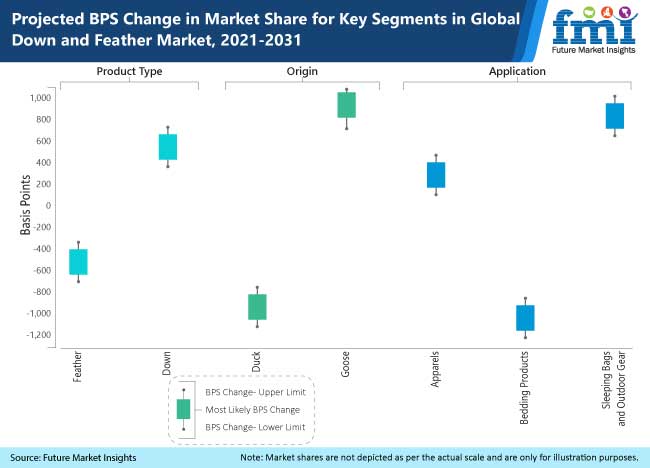Down and Feather Market 2022 by Global Key Players, Types, Applications, Countries, Industry Size and Forecast to 2031
Growth of the home décor sector and rising significance of high-quality, comfortable, and luxurious insulation in bedding products and apparel are propelling the sales of down and feather products. According to a recent report by Future Market Insights (FMI), the down and feather market is expected to surpass a valuation of US$ 13.9 Bn at a CAGR of over 7.7% through 2031.
Innovations in technology including better processing units, advanced machinery for dusting, cleaning, and processing over traditional methods have played key roles in the industry. For instance, Chun Li International Co., Ltd. increased its production capacity to improve their in-house production facilities for pre-dedusting, washing, spin-drying, drying, cooling/de-dusting, sorting, and blending that helps save on additional costs to the company.
Synthetic insulations are no longer popular in the residential sector, owing to the fact that they are hydrophobic and chemical textile fibers that are non-renewable in nature. Customers are transitioning to environmentally-friendly and certified down and feather products that are gathered as the leftovers of the food industry.
In order to compensate for this, several environment protection groups and manufacturers are partnering to promote sustainable sourcing methods. Manufacturers are participating in such activities and are also providing an image of an environment conscious group.

- To Get a Sample Copy of the Report visit @ https://www.futuremarketinsights.com/reports/sample/rep-gb-11628
2021-2031 Down and Feather Market Outlook in Comparison to Sales Registered in 2016-2020
Advancements in raw material processing methods and the proliferation of new technologies are key factors driving growth. FMI has forecast the down and feather demand to rise at 7.7% CAGR between 2021 and 2031 in comparison to the 5.0% CAGR registered during 2016-2020.
Consumers are increasingly choosing sustainable and environment-friendly products, which has led to an increase in demand for down and feather bedding. This aspect is projected to increase demand for down and feathers in the near future. The ability to reuse down and feather fillings in products like pillows and bedding is expected to boost industry prospects.
In order to meet consumer demand, recycling and reusing is performed by sterilising and washing of down and feathers. These practices are used to make handicrafts, clothing, and bedding products among other things.
In 2018, Heinric Häussling GmbH & Co. constructed a new 1200 square metre warehouse to accommodate increasing down and feather manufacturing capacity.
Higher-quality items created with environment-friendly procedures are valued more than alternative products made with chemicals and raw materials that are hazardous to the environment. Down and feather bedding that is chemical-free and animal cruelty-free is gaining popularity.
A number of corporations are cooperating with environment-protection organizations to promote social action, such as planting trees for every purchase, exploring alternative energy choices, or reducing water consumption, in addition to making luxury eco-friendly products.
- Request Complete TOC Of this Report @ https://www.futuremarketinsights.com/toc/rep-gb-11628
Key Takeaways from the Down and Feather Market Study
- Duck down and feathers are expected to hold a revenue share of 76.4% in 2021 aided by their lower cost and better quality as compared to other insulation materials.
- Bedding products dominate the market with a share of over 75% with a wider scope of product portfolios supporting sales prospects.
- The U.S. holds a noteworthy value share of 82.9% in North America owing to the high penetration of key players in the region.
- Malaysia is a key market in South Asia reflecting a CAGR of 21.5% owing to higher spending on premium products in the country.
- China showcases major opportunities for the down and feather industry owing to a larger consumer population accounting for 40.1% in 2021.
Impact of COVID-19 on the Market
The coronavirus outbreak has caused an economic downturn by disrupting corporate operations in a variety of industries. The retail sector has also witnessed a short-term slump. Temporary difficulty for market participants is the decline in terms of overall discretionary spending levels.
Consumers were subjected to maximum restrictions, which resulted in substantial decline through year-on-year revenue. During the pandemic, there was a drop in productivity due to complete lockdowns, and disruption in the industrial environment. The sales were bracketed by online retailing.
In light of this, players are concentrating their efforts on increasing internet penetration, as this allows them to reach a larger consumer base quickly and at a lower cost.
Comments
Post a Comment